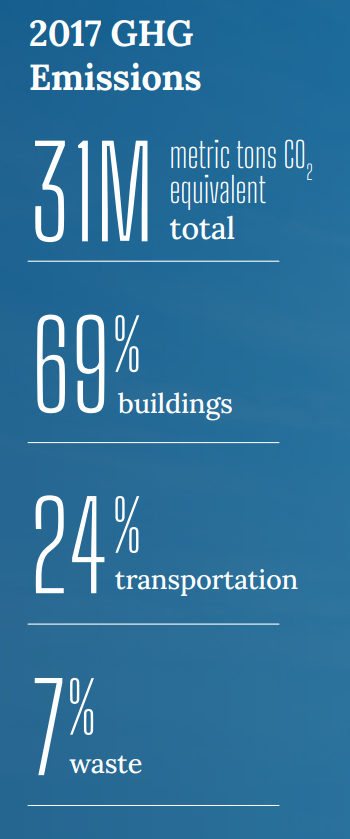Electrify Chicago
An independent tool for viewing City of Chicago building data
According to the
2022 Chicago Climate Action Plan,
69% of Chicago's emissions come from buildings, making
building emissions our biggest challenge and our biggest opportunity as a city
to tackle climate change. At Electrify Chicago, we showcase building performance using
publicly available data supplemented by community-submitted photographs and building
owners.
Start by looking at Chicago's buildings with the highest greenhouse gas intensity i.e. emissions per square foot. Large, efficient, buildings can perform much better than very inefficient small buildings on this metric.
New Article
📰 $30 Million In Missed Fines
The City Of Chicago failed to collect $30 million in potential fines from the building benchmarking ordinance, reducing transparency and accountability.
Legislative update! 🎉
As of late January 2024, legislation is being introduced to require new use more efficient forms of water and space heating, via the Clean And Affordable Buildings Ordinance (CABO), which will reduce the number of highly polluting and inefficient buildings that end up on this site.
If you're in Chicago,
write to your alderman to support the CABO!
Chicago Buildings by Greenhouse Gas Intensity
Note: Data includes large Chicago buildings with data from 2022, unless explicitly stated otherwise.
Note: This data only includes buildings whose emissions are reported
under the
Chicago Energy Benchmarking Ordinance. According to the City “As of 2016,
this list includes all commercial, institutional, and residential buildings larger than
50,000 square feet.” This dataset is also then filtered to only buildings with
reported emissions > 1,000 metric tons CO2 equivalent.
The latest year of data is from 2022, but we update the site regularly when new data is available, and some buildings may have failed to report that year, and only have older data available.
| Property Name / address | Primary Property Type |
Greenhouse Gas Intensity (kg CO2 eq./sqft) |
Total Greenhouse Emissions (metric tons CO2 eq.) |
|---|---|---|---|
|
120 North LaSalle
120 N LaSalle St
| Office | 6.5 kg/sqft
Highest 49%
| 3,082 tons
Highest 13%
|
|
The Towers
1221 N DEARBORN ST
| Multifamily Housing | 6.5 kg/sqft
Highest 49%
| 1,414 tons
Highest 34%
|
|
One Museum Park West
1201 S Prairie Ave
| Multifamily Housing | 6.5 kg/sqft
Highest 49%
| 4,265 tons
Highest 8%
|
|
Lofts At Museum Park Condominium Association
1305 S Michigan Ave
| Multifamily Housing | 6.5 kg/sqft
Highest 49%
| 1,762 tons
Highest 26%
|
|
200 N. Dearborn CA
200 N Dearborn St
| Multifamily Housing | 6.5 kg/sqft
Highest 49%
| 2,327 tons
Highest 19%
|
|
SoNo Condominium Association
860 W Blackhawk St
| Multifamily Housing | 6.5 kg/sqft
Highest 49%
| 1,962 tons
Highest 24%
|
|
626 West Jackson
626 W Jackson Blvd
| Office | 6.5 kg/sqft
Highest 49%
| 778 tons
Lowest 44%
|
|
7300 S SOUTH SHORE DR
7300 S SOUTH SHORE DR
| Multifamily Housing | 6.5 kg/sqft
Highest 49%
| 668 tons
Lowest 38%
|
|
1765 N ELSTON AVE
1765 N ELSTON AVE
| Office | 6.5 kg/sqft
Highest 49%
| 838 tons
Lowest 48%
|
|
624 S Michigan Ave
(Columbia)
624 S Michigan Ave
| College/University | 6.5 kg/sqft
Highest 49%
| 1,040 tons
Highest 44%
|
|
Long Grove House
2001 S Michigan Ave
| Multifamily Housing | 6.5 kg/sqft
Highest 49%
| 3,202 tons
Highest 12%
|
|
7345 S South Shore Dr
7345 S South Shore Dr
| Multifamily Housing | 6.5 kg/sqft
Highest 49%
| 692 tons
Lowest 39%
|
|
Twin Towers Apartments
1649 E 50th Pl
| Multifamily Housing | 6.5 kg/sqft
Highest 49%
| 1,404 tons
Highest 34%
|
|
840 W SUNNYSIDE AVE
840 W SUNNYSIDE AVE
| Multifamily Housing | 6.5 kg/sqft
Highest 49%
| 772 tons
Lowest 44%
|
|
(ILCH353) - Echelon
🕰️
353 N. Des Plaines Ave.
| Multifamily Housing | 6.5 kg/sqft | 2,177 tons |
Data Source:
Chicago Energy Benchmarking Data
